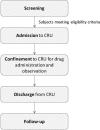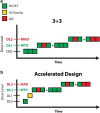Reviewing the role of healthy volunteer studies in drug development
- PMID: 30509294
- PMCID: PMC6278009
- DOI: 10.1186/s12967-018-1710-5
Reviewing the role of healthy volunteer studies in drug development
Abstract
Background: With the exception of genotoxic oncology drugs, first-in-human, Phase 1 clinical studies of investigational drugs have traditionally been conducted in healthy volunteers (HVs). The primary goal of these studies is to investigate the pharmacokinetics and pharmacodynamics of a novel drug candidate, determine appropriate dosing, and document safety and tolerability.
Main body: When tailored to specific study objectives, HV studies are beneficial to manufacturers and patients alike and can be applied to both non-oncology and oncology drug development. Enrollment of HVs not only increases study accrual rates for dose-escalation studies but also alleviates the ethical concern of enrolling patients with disease in a short-term study at subtherapeutic doses when other studies (e.g. Phase 2 or Phase 3 studies) may be more appropriate for the patient. The use of HVs in non-oncology Phase 1 clinical trials is relatively safe but nonetheless poses ethical challenges because of the potential risks to which HVs are exposed. In general, most adverse events associated with non-oncology drugs are mild in severity, and serious adverse events are rare, but examples of severe toxicity have been reported. The use of HVs in the clinical development of oncology drugs is more limited but is nonetheless useful for evaluating clinical pharmacology and establishing an appropriate starting dose for studies in cancer patients. During the development of oncology drugs, clinical pharmacology studies in HVs have been used to assess pharmacokinetics, drug metabolism, food effects, potential drug-drug interactions, effects of hepatic and renal impairment, and other pharmacologic parameters vital for clinical decision-making in oncology. Studies in HVs are also being used to evaluate biosimilars versus established anticancer biologic agents.
Conclusion: A thorough assessment of toxicity and pharmacology throughout the drug development process is critical to ensure the safety of HVs. With the appropriate safeguards, HVs will continue to play an important role in future drug development.
Keywords: Bioequivalence; First-in-human; Healthy volunteer; Medical ethics; Pharmacodynamic; Pharmacokinetic; Phase 1; Safety; Toxicity.
Figures
Similar articles
-
Integration of healthy volunteers in early phase clinical trials with immuno-oncological compounds.Front Oncol. 2022 Aug 29;12:954806. doi: 10.3389/fonc.2022.954806. eCollection 2022. Front Oncol. 2022. PMID: 36106110 Free PMC article.
-
Healthy Volunteer Studies in the Development of Anticancer Drugs with Genotoxic Findings.Ther Innov Regul Sci. 2022 Jan;56(1):76-84. doi: 10.1007/s43441-021-00330-8. Epub 2021 Aug 11. Ther Innov Regul Sci. 2022. PMID: 34379306 Free PMC article.
-
Healthy volunteers in first-in-human oncology drug development for small molecules.Br J Clin Pharmacol. 2022 Feb;88(4):1773-1784. doi: 10.1111/bcp.15092. Epub 2021 Oct 19. Br J Clin Pharmacol. 2022. PMID: 34558113 Free PMC article. Review.
-
Pharmacokinetics and safety of subcutaneous pasireotide and intramuscular pasireotide long-acting release in Chinese male healthy volunteers: a phase I, single-center, open-label, randomized study.Clin Ther. 2014 Aug 1;36(8):1196-210. doi: 10.1016/j.clinthera.2014.06.006. Epub 2014 Jul 8. Clin Ther. 2014. PMID: 25012727 Clinical Trial.
-
Pharmacokinetic properties and safety profile of histamine dihydrochloride injection in Chinese healthy volunteers: a phase I, single-center, open-label, randomized study.Clin Ther. 2015 Oct 1;37(10):2352-64. doi: 10.1016/j.clinthera.2015.07.017. Epub 2015 Aug 12. Clin Ther. 2015. PMID: 26276501 Clinical Trial.
Cited by
-
Extended Stability of Reconstituted Lyophilized Erwinia L-asparaginase in Vials.In Vivo. 2020 Sep-Oct;34(5):2419-2421. doi: 10.21873/invivo.12055. In Vivo. 2020. PMID: 32871767 Free PMC article.
-
Bayesian sequential monitoring strategies for trials of digestive cancer therapeutics.BMC Med Res Methodol. 2024 Jul 19;24(1):154. doi: 10.1186/s12874-024-02278-3. BMC Med Res Methodol. 2024. PMID: 39030498 Free PMC article.
-
Pivotal Considerations for Optimal Deployment of Healthy Volunteers in Oncology Drug Development.Clin Transl Sci. 2020 Jan;13(1):31-40. doi: 10.1111/cts.12703. Epub 2019 Oct 31. Clin Transl Sci. 2020. PMID: 31674150 Free PMC article. Review.
-
Integration of healthy volunteers in early phase clinical trials with immuno-oncological compounds.Front Oncol. 2022 Aug 29;12:954806. doi: 10.3389/fonc.2022.954806. eCollection 2022. Front Oncol. 2022. PMID: 36106110 Free PMC article.
-
Pooled analysis of routine safety parameters observed in healthy participants at baseline and following placebo administration in early phase clinical studies.Clin Transl Sci. 2024 Jan;17(1):e13715. doi: 10.1111/cts.13715. Clin Transl Sci. 2024. PMID: 38266056 Free PMC article.
References
-
- US Food and Drug Administration. Development & Approval Process (Drugs). https://www.fda.gov/Drugs/DevelopmentApprovalProcess/default.htm#Developing. Accessed 27 May 2018.
-
- Hare JM, Bolli R, Cooke JP, Gordon DJ, Henry TD, Perin EC, et al. Phase II clinical research design in cardiology: learning the right lessons too well: observations and recommendations from the Cardiovascular Cell Therapy Research Network (CCTRN) Circulation. 2013;127(15):1630–1635. doi: 10.1161/CIRCULATIONAHA.112.000779. - DOI - PMC - PubMed
-
- National Institutes of Health (NIH) Clinical Center. Patient recruitment: healthy volunteers. https://clinicalcenter.nih.gov/recruit/volunteers.html. Accessed 17 Oct 2018.
-
- CenterWatch. Overview of Clinical Trials. https://www.centerwatch.com/clinical-trials/overview.aspx. Accessed 27 May 2018.
Publication types
MeSH terms
Substances
LinkOut - more resources
Full Text Sources



